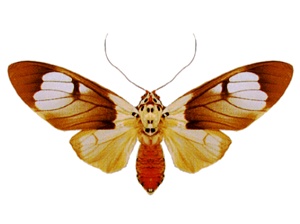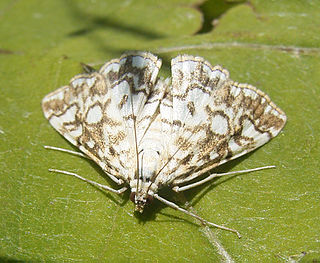Sir George Francis Hampson, 10th Baronet was an English entomologist.

Amata is a genus of tiger moths in the family Erebidae. The genus was erected by Johan Christian Fabricius in 1807.

Amerila is a genus of moths in the subfamily Arctiinae. A number of species in this genus have a special defence mechanism when they are in their adult stage. When disturbed, they exude a frothy yellow fluid from glands beside the eyes, while making a sizzling noise to ward off their attacker. Similar behaviour has been observed in fertilised females of the North-American moth Utetheisa ornatrix.

Cyana is a genus of moths in the family Erebidae. Species are well distributed in Africa, Madagascar, China, India, Sri Lanka, Myanmar, Sumatra, Java and Borneo. The genus was erected by Francis Walker in 1854.
Haemanota is a genus of moths in the family Erebidae. The genus was erected by George Hampson in 1901.

Heliactinidia is a genus of moths in the subfamily Arctiinae. The genus was erected by George Hampson in 1901.

Macrobrochis is a genus of moths in the subfamily Arctiinae first described by Gottlieb August Wilhelm Herrich-Schäffer in 1855.

Virbia is a genus of tiger moths in the family Erebidae. The genus was erected by Francis Walker in 1854.

Metasia is a genus of moths of the family Crambidae.

Udea is a genus of snout moths in the subfamily Spilomelinae of the family Crambidae. The genus was erected by Achille Guenée in 1845. The currently known 216 species are present on all continents except Antarctica. About 41 species are native to Hawaii.

Scoparia is a grass moth genus of subfamily Scopariinae. Some authors have assigned the synonymous taxon Sineudonia to the snout moth family (Pyralidae), where all grass moths were once also included, but this seems to be in error.

Bocula is a genus of moths in the family Erebidae. The genus was erected by Achille Guenée in 1852.

Loxioda is a genus of moths of the family Erebidae. The genus was described by Warren in 1913.

Omphaloceps is a genus of moths of the family Noctuidae. The genus was erected by George Hampson in 1901.

Rivula is a genus of moths in the family Erebidae described by Achille Guenée in 1845.

Callidrepana is a genus of moths belonging to the subfamily Drepaninae.

Stericta is a genus of snout moths. It was described by Julius Lederer in 1863.

Acentropinae is a fairly small subfamily of the lepidopteran family Crambidae, the crambid snout moths. Species of this subfamily are exclusively found in wetlands and aquatic habitats.
Antona caerulescens is a moth of the subfamily Arctiinae first described by George Hampson in 1900. It is found in Colombia.
Heosphora is a genus of moths in the family Pyralidae. The genus was first described by Edward Meyrick in 1882. The type species is Anerastia psamathella Meyrick, 1879, designated as such by George Hampson in 1901. All Heosphora species are found in Australia.
















